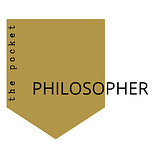Philosophers,
I hope you enjoyed yesterday’s pass over the Tao Te Ching, and what Taoist philosophy might have to say about duality, unity, and harmony.
Every morning I write an email exploring life through the eyes of the world’s greatest thinkers. Sign up here if you would like to receive it directly in your inbox.

Today, we’re going to begin what will be a brief overview of a 3 phase evolution of dualism that emerged over thousands of years in western philosophy—first in ancient Greece, then during the Platonic Renaissance in Medieval Christianity, and finally in the early days of the European enlightenment.
My hope is that by Thursday, we’ll have an understanding about where some fundamental assumptions we might be making about the universe have originated, before we investigate modern physics which will most likely challenge some of those ideas. It might emerge that we have implicitly absorbed unhelpful perspectives about our universe from classic academics, culture, and common knowledge.
The reason this topic is relevant comes right down to how we see ourselves. On one hand, we can see ourselves as separate with a right to own, dominate, and control our environment. On the other hand, we can see ourselves as integrated, present, and most importantly, one part of a very delicate living ecosystem.
Understanding how we perceive ourselves then has very real world implications in everything from climate policy, to government, and even self-esteem.
Last week’s study of epistemology and the orbit we made around knowledge set us up really well to approach dualism. If you didn’t get a chance to read last week’s letters, you can find the first one here.
If you remember, last week we investigated what thinkers, starting with Greek philosophers like Heraclitus and Plato had to say about knowledge, the world of forms, and where we gather our knowledge from.
When we think about a few of the classic problems we spent time with last week, like the problem of the one and the many for example, it is clear that these are in fact the same concepts which were being addressed by Lao Tzu. Interestingly enough, around the same time, potentially within 30 years of one another.
While Lao Tzu and future students of the Tao would create a world in which dualistic tensions were constantly seeking harmony (that is harmonious non-dualism), western thought beginning with the Greeks began speculating an inherently dualistic universe in which certain types of matter, existence, and being was higher than others.
Ultimately, Plato posited that there was a physical/material self and a spiritual self that belonged to and came from another realm. To put it another way, while the Tao approached matter as a part of nature of and thought as an emerging phenomena of that matter, Plato and many western thinkers saw the two as inherently separate and a special ability endowed to humans alone.
This means that for the next few thousand years, people who were educated by classical Greek and Roman thought (and soon after Medieval Christianity) developed a concept of self that was inherently split—separate from the rest of nature and superior to other living organisms.
The primary reason I became a student of philosophy is related to moment when I realized that our beliefs (especially about ourselves) have massive real-world consequences. Our beliefs lead us to wars, to decisions about our environment, to how we make political decisions, to how we see our neighbors and friends, even down to the way we perceive and interpret our dreams. Our beliefs ripple out in the real world in massively consequential ways.
And so, Plato will set up the next few thousands of years self-perception which effected thousands of years of human evolution—for better or worse.
For more on Plato’s perspective about mind-body Dualism, consider his reflections in Phaedo.
I hope you enjoyed today’s reflection, and I’m excited to jump a layer deeper with you tomorrow!
In the meantime, if you enjoyed this letter would you consider sharing?
Have a wonderful Tuesday, keep thinking,
-TPP
References:
https://iep.utm.edu/dualism/#H2
https://en.wikipedia.org/wiki/Mind%E2%80%93body_dualism
https://www.sparknotes.com/philosophy/plato/section3/page/3/
https://www.webpages.uidaho.edu/engl257/Classical/platonic_dualism.htm#:~:text=Platonic%20Dualism,after%20the%20other%20has%20died.
https://plato.stanford.edu/entries/dualism/#MinBod
Image:
https://en.wikipedia.org/wiki/The_School_of_Athens#/media/File:%22The_School_of_Athens%22_by_Raffaello_Sanzio_da_Urbino.jpg














Share this post